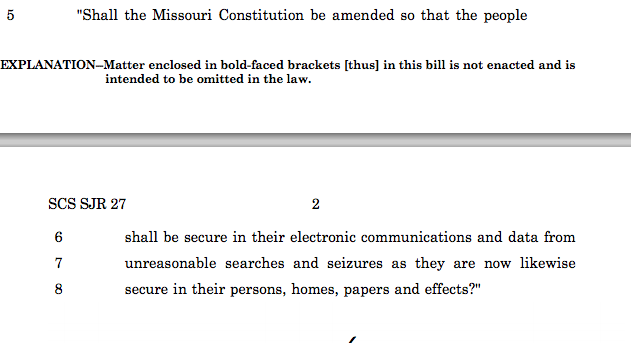The Thread For 8/6/14: Missouri Votes To Ban Warrantless Seizures of Electrical Devices
Missouri voters resoundingly ensured Tuesday evening that they would not be subjected to warrantless seizures and searches of their electronic devices by their state authorities, based on a primary ballot amendment inspired by the actions of NSA whistleblower Edward Snowden.
Seventy-five percent of voters (almost 729,000 people) in the Show Me State chose “Yes” to add Amendment 9 to Missouri’s Constitution, with only 25% casting for the other way. Amendment 9’s passing, which would ensure cell phones, laptops, tablets, and other electronic devices receive the same Fourth Amendment protections granted to people, their homes, and their other personal belongings, had gain steady bipartisan momentum in the state for months. Although the amendment does not affect the federal level, it does place a block on Missouri state departments from obtaining digital data without a warrant.
The amendment was sponsored by State Senator Rob Schaaf (R) and co-sponsored by State Senator Bob Dixon (R), and passed in the Missouri House and Senate earlier this year with little to no contention. The ACLU of Missouri and the controversial conservative group American Legislative Exchange Council were among the main supporters of the bill.
“The overwhelming support for Amendment 9 simply reflects the emotion that Missourians have for their privacy rights,” Schaaf told me on Wednesday. “People are upset and they spoke very loudly. They want the government’s snooping to stop.”
Tuesday’s vote comes weeks after a Supreme Court case in June, Riley v California, that said police cannot search a cell phone without a warrant. Sen. Schaaf felt that his bill would go one step beyond the Roberts Court’s ruling. “Amendment 9 would cover things other than cellphones, laptops, and communications,” he said after that ruling. “It (the high court ruling) only covers cellphones.”
When asked Wednesday by me if he thought the Court would revisit the issue one day, Schaaf added that “The United States needs to incorporate this into its own constitution, and that will eventually happen.”
Amendment 9 could serve as a concerning sign for the Information Sharing Environment (ISE), a national group created by the Intelligence Reform and Terrorism Prevention Act in 2004. ISE has allowed local and state officials to collaborate and trade information with authorities ranging from departments such as homeland security, foreign affairs, and intelligence, including the NSA. Some of that information, however, has been revealed to not have anything to do with combating terrorism. Amendment 9 in Missouri could prevent any meaningful impact from those gatherings with other states’ possibly taking similar actions.
Minnesota and New Hampshire have been doing just that, trying to ban warrantless data collection like Missouri has now accomplished. Utah and Minnesota earlier this year saw their governors signed laws banning cell phones tracking in their states.
“I think that other states will follow Missouri’s lead,” Schaaf said. “And hopefully Missouri voters will set a nation trend.”




Comments